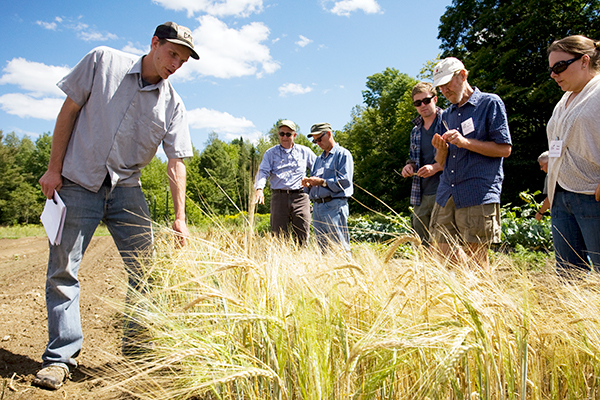
Brook Brouwer – Seed Matters Fellow in Organic Plant Breeding
Brook Brouwer grew up on a small sheep farm on Lopez Island, one of the San Juans. After college he returned to Lopez to raise cattle, hogs, goats and poultry. Fascinated by the question of how to maintain productive farms and functioning ecosystems, Brook decided to return to school to research low-input grain cropping systems for mid- and small-scale farms.
Brook was the first recipient of a Seed Matters Fellowship in organic plant breeding, and is working on his Ph.D. under the tutelage of Dr. Stephen Jones at Washington State University, Mount Vernon Research and Extension Center. Brook is focusing on three crops—barley, wheat, and dry beans—and does most of his work in the Skagit Valley, a fertile floodplain in western Washington. Small grains were once grown in abundance throughout this region, as they were throughout most of America, but as agriculture moved towards highly specialized and industrial regional centers of crop production, the maritime climates in the northwest saw a serious decline in grain production, and in the research that once supported it.
There is a new trend emerging—farmers growing vegetables or other specialty crops are realizing that small grains fit well in their systems. Brook explains, “Small grains are an important rotation for these crops – breaking disease cycles and returning organic matter to the soil.”
Unfortunately, organic grain farmers face a challenge—there has been very little breeding done for their needs, and so they rely on conventionally bred varieties. Brook describes conventional breeding as working in a “uniform environment, for a uniform market that sees the crop as a bulk commodity. The goal is to breed something that is a perfect fit in an industrial system of uniformity.”
Whereas he sees organic breeding as working in a system where there is more variables from field to market. “This creates challenges but also opens up possibilities of doing something different, including different qualities and flavors in the end product.”
While Brook points to specific needs of organic growers in breeding—better weed competition and greater resistance to disease—he also keeps the “end user” in mind. Local bakers are noting very unique flavor profiles in the wheat and rye Dr. Jones’ breeding program have developed. Brook hopes to do the same with barley malt – yes, actually breeding barley for beer production that provides local breweries with a local crop, and hopefully a locally unique flavor.
“I want to develop varieties that help farmers’ crops outcompete weeds, and have greater resistance to disease, but I’m also interested in flavor and other qualities for the consumer. It really adds another level of complexity and intrigue in plant breeding.”
